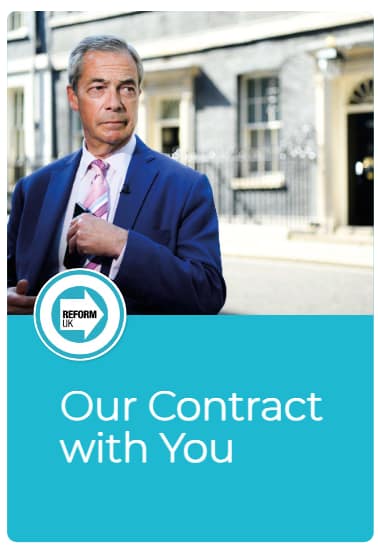Entitled “Our Contract with You”, the Reform UK manifesto for the 2024 General Election was formally launched on the 17th June 2024 in Merthyr Tydfil, Wales, by the party leader Nigel Farage.
The manifesto included five core pledges: (1) A freeze on non-essential immigration (2) No more small boats in the Channel (3) Zero NHS waiting lists (4) Lifting the tax-free allowance to £20,000 and (5) £500 a year off energy bills.
Media reaction
Positive coverage
- Some outlets noted that the Reform UK manifesto successfully tapped into voter disaffection. For example, the blog piece “Reform UK releases ‘contract’ manifesto” noted the party re-branded its manifesto as a “contract” and repositioned its election message around immigration and sovereignty, which helped generate media attention. Vuelio –
- A perspective piece (“What does Reform UK stand for?”) argued that Reform UK’s focus on hardline immigration, tax cuts and ending net-zero resonated with disaffected voters and that the manifesto marked the party evolving into a serious challenger in UK politics. The Week
Critical / sceptical commentary
- The Institute for Fiscal Studies (IFS) published a detailed reaction, arguing that the Reform manifesto’s numbers “do not add up”. They calculated tax cuts of nearly £90 billion per year combined with £50 billion of spending increases, supposedly funded by £150 billion of cuts elsewhere—an outcome the IFS regarded as “problematic” and based on “optimistic assumptions”. Institute for Fiscal Studies
- The Guardian described the launch as marred by symbolic mis-steps (Farage’s pen not working) and wrote that the manifesto “isn’t a contract. It’s a caricature.” They noted big promises (for example ~£141 billion in extra tax/spending) but little detail on how they would be achieved. The Guardian
- Environmental and conservation-oriented coverage pointed out that the manifesto largely ignored climate and nature crises. For example, the Royal Society for the Protection of Birds (RSPB) observed that there were no substantive plans to tackle environmental protections, and the party’s intention to drop retained EU environmental laws sparked concern. rspb.org.uk
Main themes of the observations
Thematic observations
- Fiscal credibility: Across outlets there was strong focus on whether the manifesto’s economic claims were plausible. The IFS and several media analyses flagged that tax-cut commitments plus increased spending would require very large savings or growth assumptions. Institute for Fiscal Studies.
- Immigration/sovereignty message: Many reports noted Reform UK emphasised immigration control and sovereignty in its manifesto—e.g., scrapping net-zero, tightening immigration, leaving the European Court of Human Rights—as much as economy. Some media said this repositioned the party into a culture-and-identity space as much as a purely fiscal party. Perspective Media
- Media coverage dynamics: According to a real-time media study by Loughborough University Centre for Research in Communication and Culture, Reform UK’s leader (Nigel Farage) was already the third most prominent political figure in the media during the campaign’s second week. The analysis observed the press adopted a “plague on both your houses” stance, and although Conservatives dominated negative headlines, the presence of Reform was growing. Loughborough University
- Policy omissions: Some commentators flagged what the manifesto omitted: for example, the RSPB pointed out little meaningful detail on nature/environment; the Institute for Government commentary noted that on housing/local government Reform UK’s document offered less detail compared to other parties. Institute for Government
Media sentiment overall
Overall, media reaction to the Reform UK manifesto was mixed to sceptical. The party received credit for tapping into voter frustration, for being bold and clear in its identity-based message, and for generating media attention. However, the fiscal realism of its plans was widely questioned; several respected outlets and policy-analysis organisations argued the numbers were implausible, the implementation path unclear, and the omission of key policy areas (especially environment) noticeable.
In short: the manifesto succeeded in framing Reform UK as a serious contender with a distinct message, but failed to convince many commentators of its credibility or completeness. Whether that credibility gap will matter to voters appears to depend on whether they prioritise bold change over precision.


